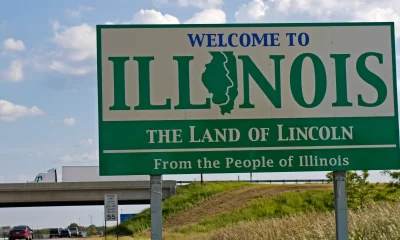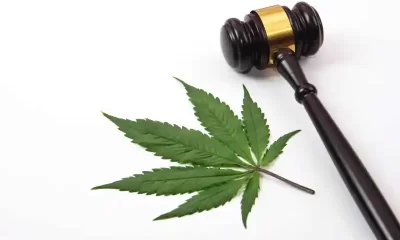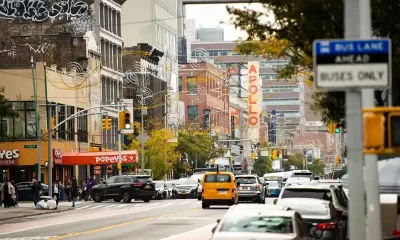Business
Virginia Officials Consider Measures To Reduce Stoned Driving

The Virginia Crime Commission is set to vote on recommendations this month.
Officials in Virginia are exploring ways to deter drivers from getting behind the wheel after getting stoned, the latest effort by the commonwealth to smooth out its new adult-use cannabis law.
The Virginian-Pilot reports that the “the Virginia Crime Commission — an arm of the General Assembly tasked with studying issues of criminal law and making recommendations — [has] discussed some potential steps police and sheriff’s offices can use to crack down on driving while high,” and that the “commission is expected to meet Dec. 5 to draft their proposals for the legislative session that begins in January.”
“One thing under consideration at the commission’s Nov. 16 meeting: changing state law to allow roadside screening devices in which officers and deputies can have a driver swab his or her cheek in order to gather saliva to test for marijuana and other drugs,” the outlet reported this week.
“Virginia officials said the ‘oral fluid tests’ under consideration to detect marijuana intoxication are similar to a ‘preliminary breath test’ — a roadside test for alcohol. The test results, while not admissible in court, can help determine when the cannabis was consumed, and can be combined with other factors to get probable cause for extensive blood testing,” the publication continued.
Kristen Howard, the executive director of the Virginia Crime Commission, told the Virginian-Pilot that officers can “swab the inside of someone’s mouth, and you get a positive or negative and it just gives you some indicators.”
“It’s designed to hone in on the recentness of use — how many hours ago you used this drug,” Howard explained.
The moves come within a month of a survey from the Virginia Cannabis Control Authority (CCA), which showed that a high number of Virginians are comfortable toking and driving.
According to the survey, roughly 23% reported consuming pot in the past three months and about 14% of drivers in the state said that they have driven high several times in the past year.
The survey also showed that a third believe marijuana improves their ability to drive safely.
Virginia officials sounded the alarm on the survey results.
“These results are worrying and underscore the General Assembly was right to direct the CCA to undertake a safe driving campaign,” said John Keohane, a board chair of the Cannabis Control Authority.
Jeremy Preiss, the CCA’s Acting Head and Chief Officer for Regulatory, Policy, and External Affairs, said that the agency must make the issue a priority.
“As a public safety and public health agency, the CCA currently has no greater priority than creating a well-funded, aggressive, and sustained campaign aimed at reducing the incidence of marijuana-impaired driving,” Preiss said.
Virginia legalized recreational cannabis last year, becoming the first state in the south to do so.
But that came under a Democratic governor, Ralph Northam. Republicans took back the governor’s mansion last year when Glenn Youngkin was elected.
Youngkin said from the start that he has no interest in rolling back the marijuana law, but his election––as well as Republicans winning back control of the state House of Delegates––has stymied its implementation.
The Democratic-controlled state Senate passed a bill earlier this year to fast-track the launch of recreational pot sales, but the legislation was rejected in the House.
Prior to taking office earlier this year, Youngkin spoke about his vision for the new cannabis program.
“When it comes to commercialization, I think there is a lot of work to be done. I’m not against it, but there’s a lot of work to be done,” Youngkin said. “There are some nonstarters, including the forced unionization that’s in the current bill. There have been concerns expressed by law enforcement in how the gap in the laws can actually be enforced. Finally, there’s a real need to make sure that we aren’t promoting an anti-competitive industry. I do understand that there are preferences to make sure that all participants in the industry are qualified to do the industry well.”
Source: https://hightimes.com/news/virginia-officials-consider-measures-to-reduce-stoned-driving/
Business
New Mexico cannabis operator fined, loses license for alleged BioTrack fraud

New Mexico regulators fined a cannabis operator nearly $300,000 and revoked its license after the company allegedly created fake reports in the state’s traceability software.
The New Mexico Cannabis Control Division (CCD) accused marijuana manufacturer and retailer Golden Roots of 11 violations, according to Albuquerque Business First.
Golden Roots operates the The Cannabis Revolution Dispensary.
The majority of the violations are related to the Albuquerque company’s improper use of BioTrack, which has been New Mexico’s track-and-trace vendor since 2015.
The CCD alleges Golden Roots reported marijuana production only two months after it had received its vertically integrated license, according to Albuquerque Business First.
Because cannabis takes longer than two months to be cultivated, the CCD was suspicious of the report.
After inspecting the company’s premises, the CCD alleged Golden Roots reported cultivation, transportation and sales in BioTrack but wasn’t able to provide officers who inspected the site evidence that the operator was cultivating cannabis.
In April, the CCD revoked Golden Roots’ license and issued a $10,000 fine, according to the news outlet.
The company requested a hearing, which the regulator scheduled for Sept. 1.
At the hearing, the CCD testified that the company’s dried-cannabis weights in BioTrack were suspicious because they didn’t seem to accurately reflect how much weight marijuana loses as it dries.
Company employees also poorly accounted for why they were making adjustments in the system of up to 24 pounds of cannabis, making comments such as “bad” or “mistake” in the software, Albuquerque Business First reported.
Golden Roots was fined $298,972.05 – the amount regulators allege the company made selling products that weren’t properly accounted for in BioTrack.
The CCD has been cracking down on cannabis operators accused of selling products procured from out-of-state or not grown legally:
- Regulators alleged in August that Albuquerque dispensary Sawmill Sweet Leaf sold out-of-state products and didn’t have a license for extraction.
- Paradise Exotics Distro lost its license in July after regulators alleged the company sold products made in California.
Golden Roots was the first alleged rulebreaker in New Mexico to be asked to pay a large fine.
Source: https://mjbizdaily.com/new-mexico-cannabis-operator-fined-loses-license-for-alleged-biotrack-fraud/
Business
Marijuana companies suing US attorney general in federal prohibition challenge

Four marijuana companies, including a multistate operator, have filed a lawsuit against U.S. Attorney General Merrick Garland in which they allege the federal MJ prohibition under the Controlled Substances Act is no longer constitutional.
According to the complaint, filed Thursday in U.S. District Court in Massachusetts, retailer Canna Provisions, Treevit delivery service CEO Gyasi Sellers, cultivator Wiseacre Farm and MSO Verano Holdings Corp. are all harmed by “the federal government’s unconstitutional ban on cultivating, manufacturing, distributing, or possessing intrastate marijuana.”
Verano is headquartered in Chicago but has operations in Massachusetts; the other three operators are based in Massachusetts.
The lawsuit seeks a ruling that the “Controlled Substances Act is unconstitutional as applied to the intrastate cultivation, manufacture, possession, and distribution of marijuana pursuant to state law.”
The companies want the case to go before the U.S. Supreme Court.
They hired prominent law firm Boies Schiller Flexner to represent them.
The New York-based firm’s principal is David Boies, whose former clients include Microsoft, former presidential candidate Al Gore and Elizabeth Holmes’ disgraced startup Theranos.
Similar challenges to the federal Controlled Substances Act (CSA) have failed.
One such challenge led to a landmark Supreme Court decision in 2005.
In Gonzalez vs. Raich, the highest court in the United States ruled in a 6-3 decision that the commerce clause of the U.S. Constitution gave Congress the power to outlaw marijuana federally, even though state laws allow the cultivation and sale of cannabis.
In the 18 years since that ruling, 23 states and the District of Columbia have legalized adult-use marijuana and the federal government has allowed a multibillion-dollar cannabis industry to thrive.
Since both Congress and the U.S. Department of Justice, currently headed by Garland, have declined to intervene in state-licensed marijuana markets, the key facts that led to the Supreme Court’s 2005 ruling “no longer apply,” Boies said in a statement Thursday.
“The Supreme Court has since made clear that the federal government lacks the authority to regulate purely intrastate commerce,” Boies said.
“Moreover, the facts on which those precedents are based are no longer true.”
Verano President Darren Weiss said in a statement the company is “prepared to bring this case all the way to the Supreme Court in order to align federal law with how Congress has acted for years.”
While the Biden administration’s push to reschedule marijuana would help solve marijuana operators’ federal tax woes, neither rescheduling nor modest Congressional reforms such as the SAFER Banking Act “solve the fundamental issue,” Weiss added.
“The application of the CSA to lawful state-run cannabis business is an unconstitutional overreach on state sovereignty that has led to decades of harm, failed businesses, lost jobs, and unsafe working conditions.”
Business
Alabama to make another attempt Dec. 1 to award medical cannabis licenses

Alabama regulators are targeting Dec. 1 to award the first batch of medical cannabis business licenses after the agency’s first two attempts were scrapped because of scoring errors and litigation.
The first licenses will be awarded to individual cultivators, delivery providers, processors, dispensaries and state testing labs, according to the Alabama Medical Cannabis Commission (AMCC).
Then, on Dec. 12, the AMCC will award licenses for vertically integrated operations, a designation set primarily for multistate operators.
Licenses are expected to be handed out 28 days after they have been awarded, so MMJ production could begin in early January, according to the Alabama Daily News.
That means MMJ products could be available for patients around early March, an AMCC spokesperson told the media outlet.
Regulators initially awarded 21 business licenses in June, only to void them after applicants alleged inconsistencies with how the applications were scored.
Then, in August, the state awarded 24 different licenses – 19 went to June recipients – only to reverse themselves again and scratch those licenses after spurned applicants filed lawsuits.
A state judge dismissed a lawsuit filed by Chicago-based MSO Verano Holdings Corp., but another lawsuit is pending.
Source: https://mjbizdaily.com/alabama-plans-to-award-medical-cannabis-licenses-dec-1/
-

 Business2 years ago
Business2 years agoPot Odor Does Not Justify Probable Cause for Vehicle Searches, Minnesota Court Affirms
-

 Business2 years ago
Business2 years agoNew Mexico cannabis operator fined, loses license for alleged BioTrack fraud
-

 Business2 years ago
Business2 years agoAlabama to make another attempt Dec. 1 to award medical cannabis licenses
-

 Business2 years ago
Business2 years agoWashington State Pays Out $9.4 Million in Refunds Relating to Drug Convictions
-

 Business2 years ago
Business2 years agoMarijuana companies suing US attorney general in federal prohibition challenge
-

 Business2 years ago
Business2 years agoLegal Marijuana Handed A Nothing Burger From NY State
-

 Business2 years ago
Business2 years agoCan Cannabis Help Seasonal Depression
-

 Blogs2 years ago
Blogs2 years agoCannabis Art Is Flourishing On Etsy













